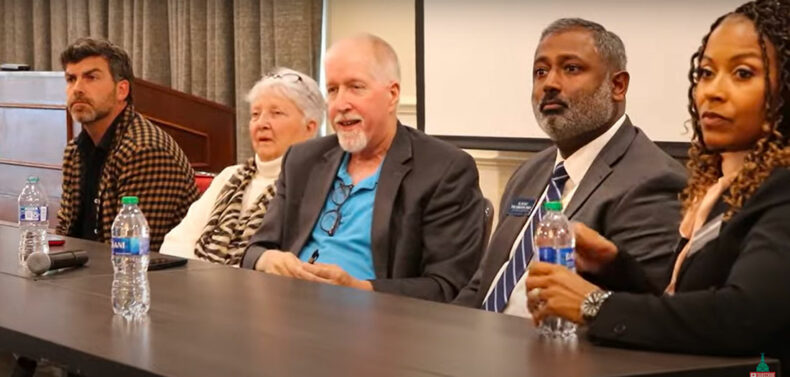At a recent forum held by conservative group Athens Classic, three candidates for Athens-Clarke County Commission said that they would vote to overturn a 2019 resolution of support for Athens’ immigrant and undocumented communities and that they would not approve of Athens being a resettlement site for refugees.
When asked by audience member James DePaola at the Mar. 27 forum if they would vote to “repeal, rescind, reverse” the 2019 resolution and the 2022 “backroom deal” to resettle refugees in Athens, commission candidates Jason Jacobs, Stephanie Johnson and Sidney Waters all responded affirmatively.
However, there was never any “backroom deal” in 2022, and it is not actually possible to repeal a resolution. The 2019 resolution characterizing Athens as a “welcoming community” for immigrants will always remain as a reflection of the commission’s will at the time the resolution was passed. The 2019 resolution does not have the force of law, and neither did the letters sent by Mayor Kelly Girtz to the U.S. State Department in support of a nonprofit that wanted to resettle up to 125 refugees.
What these candidates could do, if elected, would be to pass another resolution containing their opinions and beliefs about the best way to move forward. They could say, for example, that they don’t want Athens to be a refugee resettlement site—although State Department-designated nonprofits make the final decision—and that Athens should not be welcoming to undocumented immigrants.
Jacobs, who is running for commission in District 2, a left-leaning area that includes Boulevard, Normaltown and part of East Athens, said that he doesn’t agree with the 2019 resolution overall, and that he would be interested in passing a new resolution that he feels the community would better support.
“[The 2019 resolution] sent a message of, ‘Come one, come all. Our doors are open to come in. If you need something, come here. If you cross illegally, don’t worry about it,’” Jacobs said. “My grandparents came here from Greece. They came here legally… Absolutely come one, come all, but if you’re coming in to look for a place to hide away from something else? And how can you distinguish one person from another?”
Research has shown that undocumented immigrants commit far fewer crimes than U.S. citizens per person, including violent crimes. These immigrants are a vital part of the Georgia economy, particularly in the agricultural industry where they often face exploitative labor practices, including wage theft, human trafficking and even slavery.
The 2019 resolution in support of Athens’ immigrant and undocumented communities was written during the Trump presidency in a time of fear and uncertainty for migrants across the country. Trump’s draconian immigration policies separated thousands of families at the border, many of whom have yet to be reunited. A mass shooting in El Paso, TX that claimed the lives of 23 people—the deadliest attack on Hispanic Americans in modern U.S. history—took place just weeks before the resolution was written, as did large-scale immigration raids in Mississippi. The immigrant community in Athens was deeply troubled by these events.
“Kids in our community are living in fear and terror of the immigration police and of the shootings,” Maria Fernandez told the ACC Commission in 2019. “Three weeks ago, they came to my house. My kids cried a lot. I have an 8-year-old boy and a 2-year-old girl. I didn’t know what to do. I didn’t know what to tell them… Just today they heard someone knocking on the door. They said, ‘Don’t open, mom, I don’t want them to separate us.’”
Multiple community members delivered a similar message that evening to the mayor and commission in Spanish, with English translation provided by the immigrant rights group Dignidad Inmigrante en Athens.
The 2019 resolution proclaimed that Athens “embraces and celebrates” cultural diversity and that the Athens community benefits from the “hard work, cultural offerings and tax dollars of the immigrants who call Athens, Georgia home.” It recognized that Athens is safer when all people feel comfortable interacting with police and urged that Athens’ families must be allowed to stay together.
The resolution denounced white supremacy and expressed the government’s commitment at that time to reverse the damage such bigotry has caused to communities of color. Depending on which commission candidates find success in the 2024 local election, this commitment may begin to waver.
The 2019 resolution passed unanimously, with current commissioners Patrick Davenport, Melissa Link, Allison Wright, Ovita Thornton and Mike Hamby all voting in favor. Yet only Link was targeted in a recall petition filed by DePaola. (Elections officials would not allow the petition to move forward because DePaola does not live in Link’s district.)
“I have always said that this local government needs to lead,” Thornton said to the assembled crowd in 2019. “God, you’re not any different from anybody else. I have experience with Black racism, Black culture being denied… This vote was very important for me today, to make a statement, to show my support.”
When protesters showed up to City Hall last month following Laken Riley’s murder, Thornton said she regretted that the resolution was not worded differently.
The Athens Immigrant Rights Coalition was heavily involved in drafting the language for the resolution, as were Dignidad Inmigrante en Athens, then-commissioner Tim Denson and Girtz.
Jacobs is opposed by Link in District 2, Johnson by Rashe Malcolm in District 6 and Waters by Commissioner Carol Myers in District 8.
Like what you just read? Support Flagpole by making a donation today. Every dollar you give helps fund our ongoing mission to provide Athens with quality, independent journalism.










